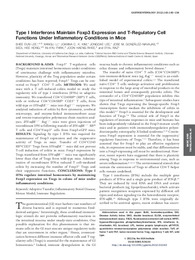Please use this identifier to cite or link to this item:
https://hdl.handle.net/11000/35487
Type I Interferons Maintain Foxp3 Expression and T-Regulatory Cell Functions Under Inflammatory Conditions in Mice
Title:
Type I Interferons Maintain Foxp3 Expression and T-Regulatory Cell Functions Under Inflammatory Conditions in Mice |
Authors:
Lee, Shee Eun 
Li, Xiangli 
Kim, Joanna 
LEE, JONGDAE
González-Navajas, Jose Manuel 
HONG, SEOL HEE
Park, In Kyu 
Rhee, Joon Haeng 
Raz, Eyal  |
Editor:
W.B. Saunders |
Department:
Departamentos de la UMH::Farmacología, Pediatría y Química Orgánica |
Issue Date:
2012-07 |
URI:
https://hdl.handle.net/11000/35487 |
Abstract:
Background & aims: Foxp3(+) T-regulatory cells (Tregs) maintain intestinal homeostasis under conditions of continuous challenge with inflammatory microbes. However, plasticity of the Treg population under certain conditions has been reported; Foxp3(+) Tregs can be converted to Foxp3(-) CD4(+) T cells.
Methods: We used mice with a T cell-induced colitis model to study the regulatory role of type I interferons (IFNs) in adaptive immunity. We transferred CD4(+)CD45RB(hi) (RB(hi)) T cells, with or without CD4(+)CD45RB(lo) CD25(+) T cells, from wild-type or IFN-αβR(-/-) mice into Rag1(-/-) recipients. We analyzed induction of colitis by flow cytometry, confocal microscopy, and enzyme-linked immunosorbent assay and reverse-transcription polymerase chain reaction analyses. IFN-αβR(-/-)Rag(-/-) mice were given injections of recombinant IFN-α following transfer of IFN-αβR(-/-) RB(hi) T cells and CD4(+)Foxp3(+) cells from Foxp3-eGFP mice.
Results: Signaling by type I IFNs was required for maintenance of Foxp3 expression and the suppressive activity of Tregs in mice. Transfer of CD4(+)CD45RB(lo)CD25(+) Tregs from IFN-αβR(-/-) mice did not prevent T-cell induction of colitis in mice. Foxp3 expression by Tregs transferred from IFN-αβR(-/-) mice was significantly lower than that of Tregs from wild-type mice. Administration of recombinant IFN-α reduced T cell-mediated colitis by increasing the number of Foxp3(+) Tregs and their suppressive functions.
Conclusions: Type I IFNs regulate intestinal homeostasis by maintaining Foxp3 expression on Tregs in colons of mice under inflammatory conditions.
|
Keywords/Subjects:
Adoptive Transfer
Inflammatory Bowel Disease
Mouse Model
Immune Regulation |
Type of document:
info:eu-repo/semantics/article |
Access rights:
info:eu-repo/semantics/openAccess
Attribution-NonCommercial-NoDerivatives 4.0 Internacional |
DOI:
10.1053/j.gastro.2012.03.042 |
Published in:
Gastroenterology. 2012 Jul;143(1):145-54 |
Appears in Collections:
Artículos - Farmacología, Pediatría y Química Orgánica
|
 ???jsp.display-item.text9???
???jsp.display-item.text9???

.png)
